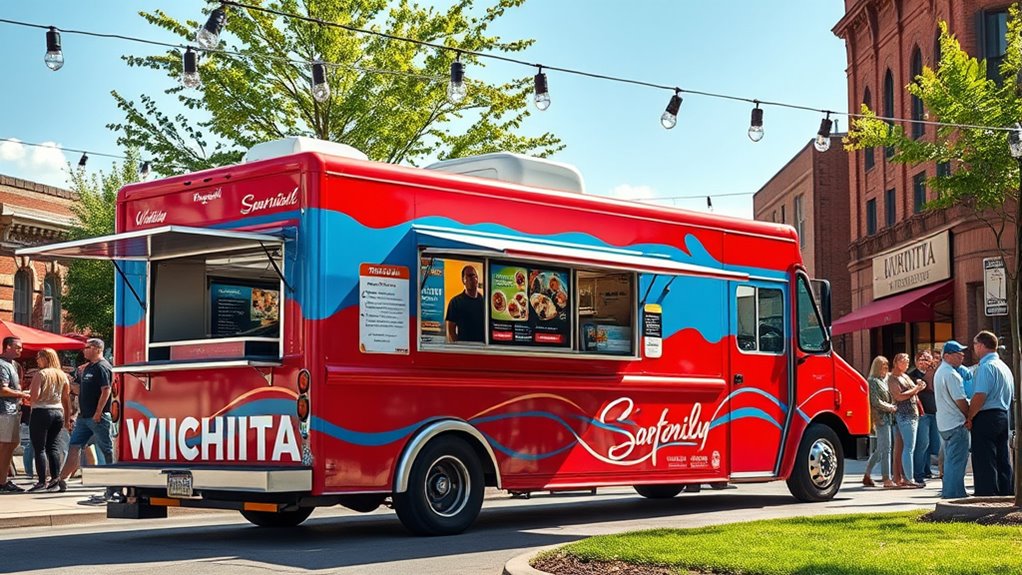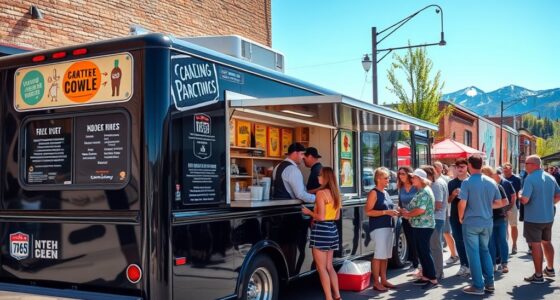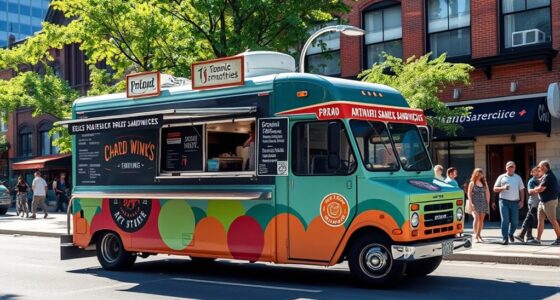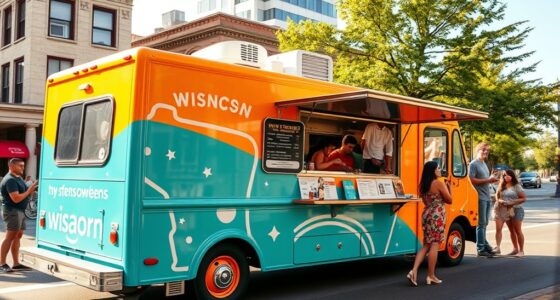To open a food truck in Wichita, Kansas, you’ll need permits like a Mobile Food Vendor License ($350/year), a Food Establishment License, and a Kansas Sales Tax Permit, with total startup costs around $5,000–$20,000. Find compliant locations, follow zoning rules, and display permits visibly. Design a safe menu with strict food safety standards. For tips on marketing and managing your new venture, keep exploring the essential steps to guarantee success.
Key Takeaways
- Obtain required licenses including Mobile Food Vendor, Food Establishment, and Kansas Sales Tax Permit, with total startup costs around $1,800–$2,000.
- Budget $5,000–$20,000 for vehicle, equipment, permits, and initial inventory; ensure compliance with health and fire safety standards.
- Operate only in approved vending zones, follow parking rules, and secure permissions for private property or special event locations.
- Design menus that meet food safety guidelines, properly store and handle ingredients, and maintain temperature controls for safety.
- Promote your food truck via social media, participate in local events, and develop loyalty programs to grow customer engagement.
Navigating Permits and Licensing in Wichita
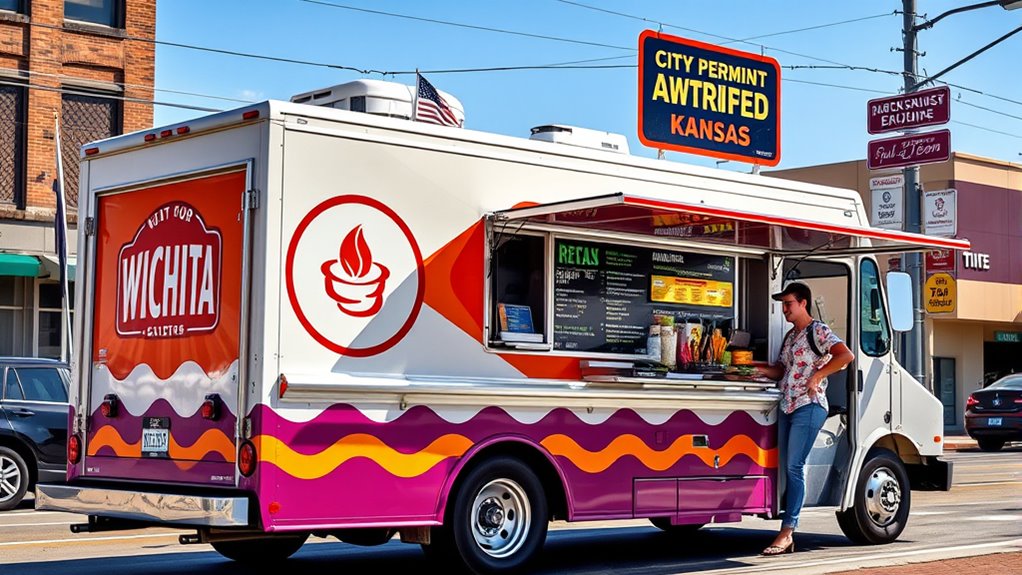
Managing permits and licensing in Wichita requires you to complete several steps before you can legally operate your food truck. First, you need a Mobile Food Vendor License, which costs $350 annually or $50 for special event permits. You also must obtain a Food Establishment License from the Kansas Department of Agriculture, with fees based on your facility size and food handling. A Kansas Sales Tax Permit is essential for collecting taxes on food sales. If you’re operating as a corporation or LLC, you must register with the Kansas Secretary of State beforehand. Additionally, you’re required to use a commissary kitchen for storage, prep, and cleaning, complying with Wichita health regulations. Submitting your application, passing health and fire safety inspections, and providing proof of insurance are all part of the process. Successfully obtaining all necessary permits ensures your business remains compliant and avoids potential fines or shutdowns. Familiarizing yourself with local health codes and food safety standards is also crucial for ongoing compliance and successful operation.
Estimating Startup Expenses for Your Food Truck
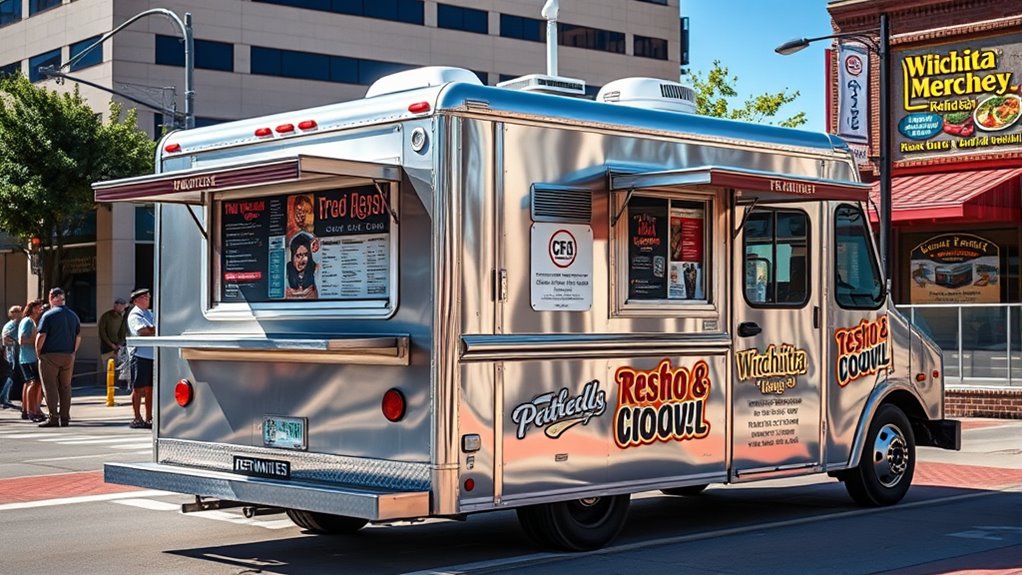
Estimating startup expenses for your food truck is a crucial step in planning your business, as costs can vary widely depending on your choices. To get an accurate picture, consider these key areas:
- Vehicle and Equipment: A used truck runs about $30,000, while new or customized models can cost up to $85,000. Outfitting with appliances adds roughly $40,000 to $45,000. The size of the food truck and level of customization significantly influence overall costs. It’s also important to evaluate the kitchen equipment needed to efficiently prepare your menu items.
- Licensing and Permits: Expect to spend between $1,800 and $2,000 for permits, with total startup costs including permits and licenses ranging from $5,000 to $20,000.
- Initial Inventory and Supplies: Starting food and beverage inventory can cost $2,000 to $3,000, plus around $300 for disposables and serveware.
Careful budgeting helps guarantee your food truck launch is financially successful.
Choosing the Right Location and Zoning Compliance
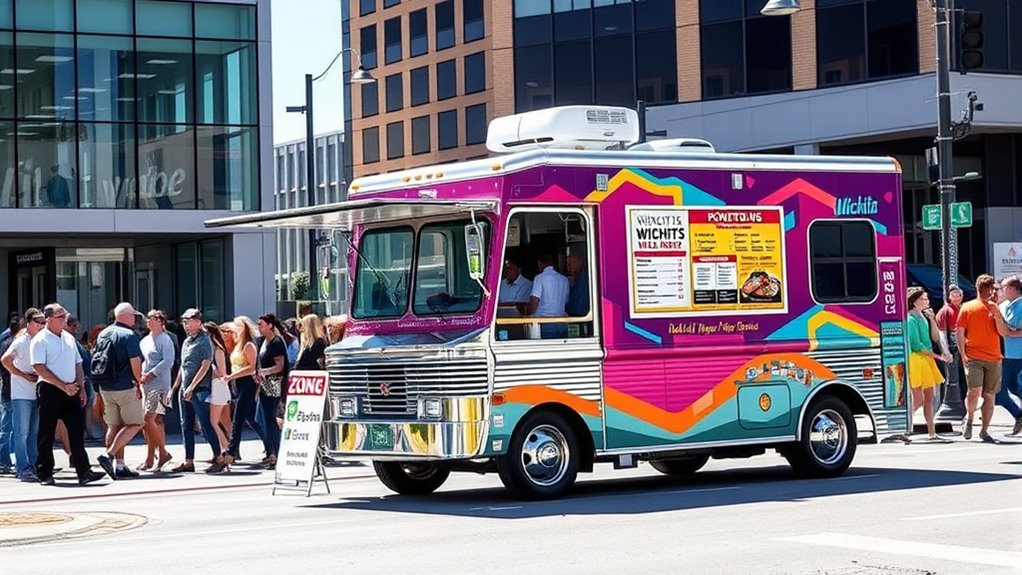
To succeed, you need to choose locations that conform with Wichita’s zoning restrictions and designated vending areas. Make sure your truck is parked legally, avoiding prohibited zones and following parking and storage rules. Consulting the city’s zoning department can help ensure your spot meets all regulations and keeps your operation running smoothly. Staying updated on local ordinances is essential, as rules and designated vending zones can change over time. Additionally, understanding cookie and privacy policies can be important for maintaining transparency and compliance with online presence requirements.
Zoning Restrictions Overview
Choosing the right location for your food truck in Wichita requires careful attention to zoning restrictions. You must operate only in zones that permit mobile food vending, which are clearly defined in city ordinances. Here are key points to contemplate:
- Certain commercial zones are favored, while residential areas are generally off-limits to prevent nuisances.
- Operating on public right-of-way demands adherence to specific location restrictions set by the city.
- Locations near sensitive areas like hospitals, schools, or city property often need special permissions or have additional restrictions.
- Consult the local zoning maps and ordinances to confirm that your intended vending site is authorized for food truck operations, ensuring compliance with zoning regulations.
- Staying updated on local enforcement policies can help you avoid unexpected violations and fines.
Ensure your chosen site aligns with zoning laws before applying for permits. Failure to comply can lead to fines, permit revocation, or operation bans. Continuous enforcement from city officials guarantees adherence to safety and zoning rules.
Designated Vending Areas
In Wichita, operating your food truck within designated vending areas guarantees compliance with city regulations and helps you avoid penalties. You must serve on approved public properties, following park rules and securing necessary permits. Vending near restaurants is restricted within 150 feet unless you get written permission from management. Specific locations require written approval or special event permits, which specify exact zones for vending. You need to display vehicle-specific licenses and decals visibly at all times. Inspections by fire and building officials ensure your vending unit’s safety and compliance. Be aware that vending on city sidewalks or medians isn’t allowed unless pre-authorized. Staying within designated areas, securing proper permits, and adhering to restrictions will keep you compliant and avoid fines or misdemeanor charges. Outdated browsers may cause issues with online permit applications or accessing digital resources.
Parking & Storage Rules
Ensuring your food truck is parked legally and complies with zoning rules is essential for smooth operations in Wichita. First, you must park in designated areas—on streets, alleys, sidewalks, or public rights-of-way—avoiding illegal spots. Second, vending is only permitted in safe, pedestrian-friendly zones, not directly in the street. Third, parking on public park property requires explicit permission, and storage on private property needs owner approval. To stay compliant, follow these steps: 1. Confirm parking on public property aligns with city regulations and obtain permits if necessary. 2. Avoid obstructing traffic lanes, accessible routes, or creating hazards. 3. Secure all permits for long-term storage, ensuring compliance with zoning and safety rules. Additionally, parking in designated areas must adhere to specific time limits and restrictions set by city ordinances to prevent violations. Properly understanding and following zoning compliance and parking regulations helps prevent penalties and ensures your business remains operational. Sticking to these rules keeps your business legal and operational.
Crafting a Menu That Meets Food Safety Standards
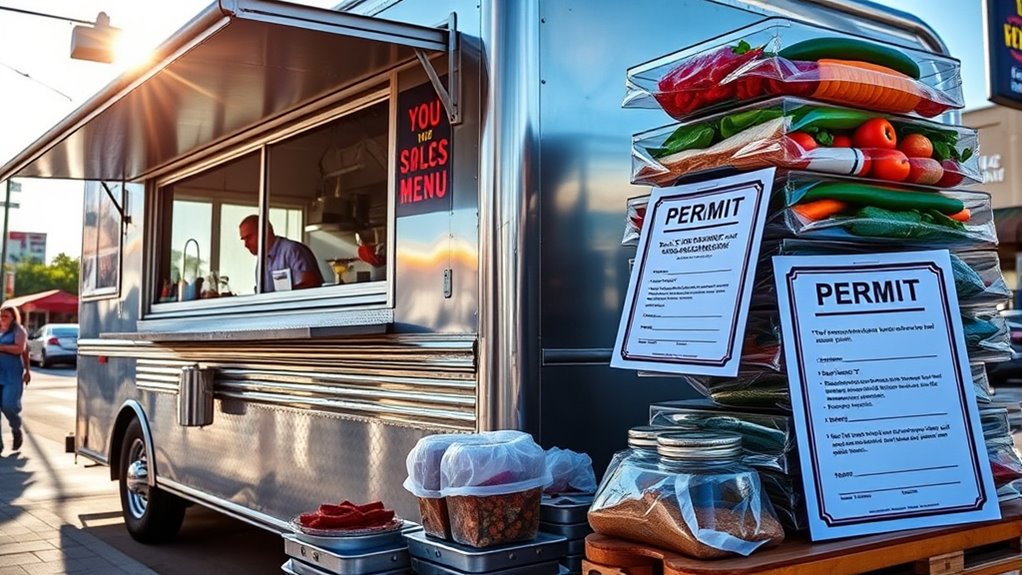
To create a safe and compliant menu, you need to follow proper food handling techniques and make certain your items meet storage and preparation standards. Choose foods that are easy to keep at safe temperatures and avoid high-risk ingredients that require complex controls. By carefully planning your menu, you can prevent cross-contamination and stay within all food safety regulations. Additionally, ensure your menu items are consistent with health compliance standards, as approval for food truck permits depends on adhering to these regulations. Regularly monitoring your air quality considerations, such as maintaining proper ventilation and avoiding high humidity areas, can also contribute to a safer environment for food preparation.
Safe Food Handling Techniques
Crafting a menu that meets food safety standards starts with implementing proper handling techniques throughout your food operation. To do this effectively, focus on these key practices:
- Personal hygiene: Always wash hands with soap and warm water before handling food, after touching raw ingredients, or using the bathroom. Use gloves or utensils instead of bare hands on ready-to-eat foods.
- Temperature control: Keep hot foods above 135°F and cold foods below 41°F. Regularly check and record temperatures with calibrated thermometers to prevent bacterial growth.
- Surface sanitation: Clean and sanitize food contact surfaces frequently using approved sanitizers. Use separate cutting boards for raw meats and ready-to-eat foods to prevent cross-contamination.
- Color accuracy and proper calibration: Ensuring accurate color temperature adjustments can help maintain optimal lighting conditions, which is essential for proper food presentation and safety standards.
Menu Item Compatibility
Designing a menu that aligns with food safety standards requires careful consideration of ingredient interactions and allergen management. You need to avoid combining raw and cooked products without proper separation to reduce cross-contamination risks. Allergen control is vital—dedicate prep areas and tools for allergen-containing dishes and clearly label common allergens on menus per Kansas Food Code standards. Be mindful of chemical reactions or spoilage, especially in sauces and dressings, when pairing ingredients. Limit raw or undercooked animal products unless you have documented hazard controls. Guarantee all menu items comply with Kansas Food Code updates, and consider your equipment’s capabilities—favor simple, portable foods that fit your truck’s refrigeration and cooking limits. Incorporate seasonal, local ingredients carefully, maintaining safety protocols for freshness and availability. Proper handling procedures are essential for maintaining food safety and preventing contamination throughout the preparation process.
Storage and Preparation Guidelines
Ensuring proper storage and preparation is essential for maintaining food safety standards in your food truck. To do this effectively, focus on these key points:
- Keep cold foods at 41°F (5°C) or below and hot foods at 135°F (57°C) or above to prevent bacterial growth.
- Store raw and cooked foods separately using physical barriers or distinct containers to avoid cross-contamination.
- Use food-grade, non-absorbent surfaces and containers that are easy to clean, ensuring sanitary storage and prep areas.
- Regularly calibrate your thermometers to ensure accurate temperature readings, which is crucial for food safety compliance. thermometer accuracy
- Design your workspace for efficient cleaning and sanitizing, and handle ready-to-eat foods with gloves or utensils to prevent contamination. Proper food safety practices include maintaining cleanliness and personal hygiene during all stages of food handling.
- Regularly monitor temperatures during prep, and follow Kansas Food Code guidelines to keep your food safe and compliant.
Effective Marketing Strategies to Grow Your Business
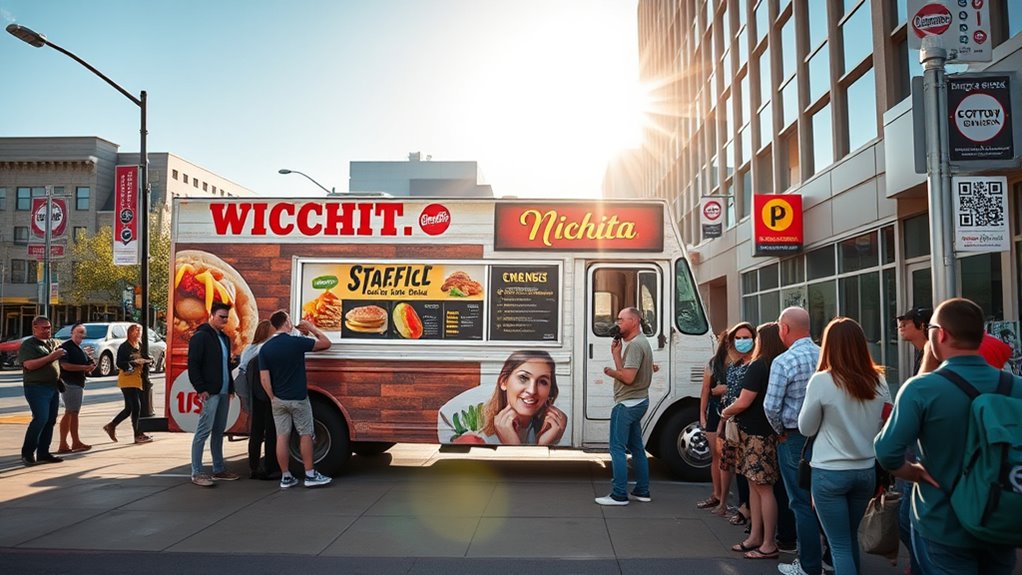
To grow your food truck business effectively, leveraging a mix of marketing strategies is vital. Social media is a powerful tool—68% of owners use platforms like Facebook, boosting sales by around 20%. Customers often find trucks through social media ads, with 40% discovering their favorites online. Active engagement can lead to 15% higher spending, so keep your content fresh and interactive. Participating in local events and festivals—at least three annually—is also essential for visibility and customer connection. Many trucks use loyalty programs to increase repeat visits by 30%, while email marketing keeps customers informed and engaged. Tailoring your menu to local tastes and younger demographics, combined with using GPS apps and data analytics, guarantees your marketing efforts are targeted, effective, and drive sustained growth. Additionally, over 50% of food trucks have implemented loyalty programs, resulting in a 30% increase in repeat visits. Incorporating relationship-building exercises such as engaging storytelling or personal interactions can further enhance customer loyalty and brand affinity.
Managing Operations and Legal Responsibilities
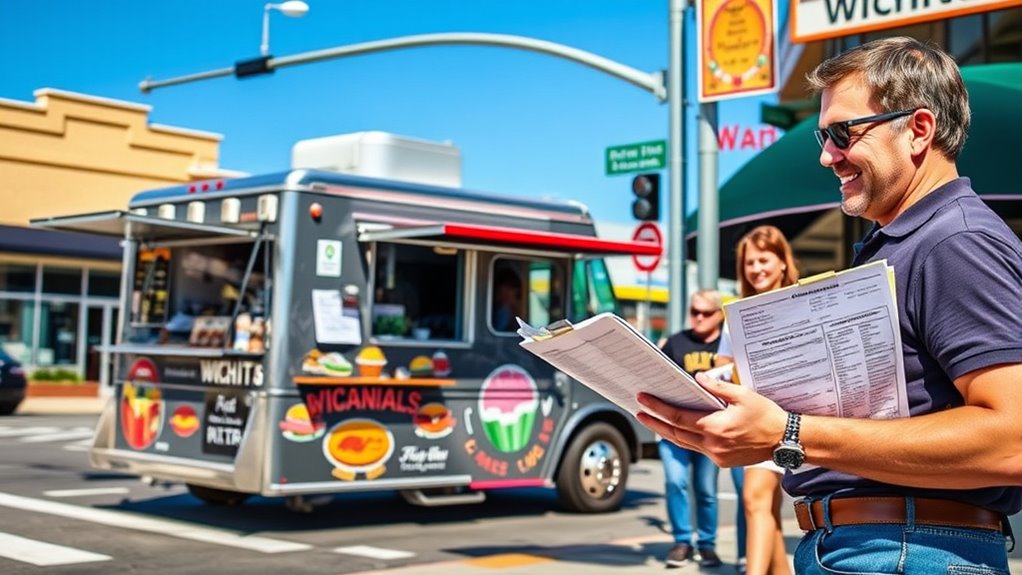
Managing operations and legal responsibilities for your food truck requires diligent compliance with local regulations and proactive oversight. To stay on top, focus on these key areas:
- Licensing and Permits: Obtain and renew the Mobile Food Vendor License annually, secure a Food Establishment License, and get a Kansas Sales Tax Permit. Register your business with the Kansas Secretary of State if needed.
- Health and Safety: Pass health inspections, operate from a licensed commissary, and comply with fire safety rules. Keep all permits visible and conduct background checks on staff.
- Zoning and Financials: Follow local zoning laws, store the truck properly, and secure special event permits when applicable. Maintain liability insurance, pay licensing fees, and keep detailed records for audits.
Staying compliant guarantees smooth operations and avoids costly violations.
Frequently Asked Questions
How Long Does the Permitting Process Typically Take in Wichita?
You’re probably wondering how long permits take in Wichita. Typically, general business licenses process in 1-2 weeks, but food vendor permits needing health inspections can take 3-4 weeks or more. If you’re applying for university permits or plan reviews, expect around two to four weeks. To expedite things, submit your application early, verify all documents are complete, and prepare for inspections promptly. Peak seasons may extend processing times.
Are There Restrictions on Operating Hours for Food Trucks?
You should know that Wichita has specific restrictions on food truck operating hours. You can’t operate between 1 a.m. and 6 a.m., unless you get written permission. These rules aim to protect public safety and reduce noise disturbances. Make sure to plan your schedule accordingly, and avoid violations that could lead to fines or permit revocation. Always check local ordinances to stay compliant and operate smoothly.
Can I Operate a Food Truck on Private Property Without City Approval?
You can’t operate a food truck on private property in Wichita without city approval. Even if you have written permission from the property owner, you still need to obtain the proper permits and comply with local regulations. Operating without city approval can lead to fines, permit revocation, or removal. Always guarantee you have both owner permission and city authorization before starting your food truck operations on private property.
What Are the Specific Health Inspection Criteria for Food Trucks?
Think of a health inspection as a health check-up for your food truck. You’ll need to show that all food sources are approved, stored properly, and free from contamination. Your equipment must work perfectly, maintaining safe temperatures. Sanitary facilities, waste disposal, ventilation, and lighting are closely examined. If everything’s in order, you’ll pass; if not, you’ll need to fix issues to meet Wichita’s strict standards.
How Do I Handle Food Truck Parking During Off-Hours?
When handling food truck parking during off-hours, you need to follow local regulations. Always park on private property with permission or in designated vendor lots like Wichita State’s. Avoid street parking overnight and keep your truck secure, locking doors and propane tanks. Confirm your licenses stay current, maintain cleanliness, and check that your location complies with zoning and safety rules. Planning ahead helps prevent fines and ensures smooth operations.
Conclusion
Launching your food truck in Wichita is like planting a seed in fertile ground—careful planning and passion will cultivate a thriving future. Stay attentive to permits, costs, and locations, and let your menu be a flavorful compass guiding customers to your door. With smart marketing and diligent management, your business will blossom amidst the city’s vibrant streets, transforming your dreams into a bustling reality that leaves a delicious mark on Wichita’s culinary landscape.
